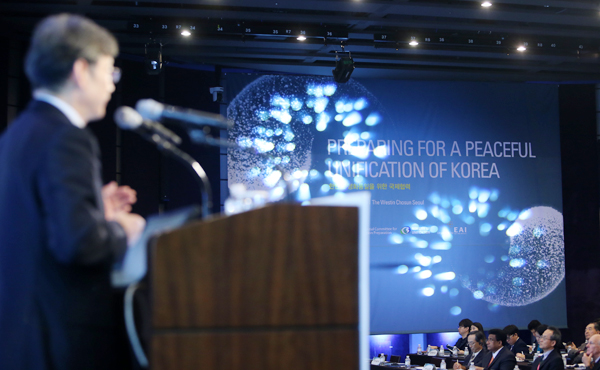
|
“How to Prepare for a Peaceful Unification of Korea”
EAI, in cooperation with the Presidential Committee for Unification Preparation and the Ministry of Unification, held an international conference entitled “Preparing for a Peaceful Unification of Korea” at the Westin Chosun Seoul Hotel on November 13. Experts from South Korea, the U.S, China, Japan, and Europe discussed the current situation in Northeast Asia, preparation for unification of the Korean Peninsula, challenges for peaceful unification, support for economic development in North Korea, and North Korea’s peaceful use of the border area. 
|
|
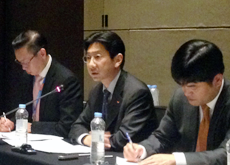
|
|
“Corporate Citizenship and Collaborative Governance”
On November 4, East Asia Institute (EAI), in partnership with Center for International Private Enterprise (CIPE), held an assembly workshop to discuss the role of collaborative governance and corporate citizenship in promoting democracy. 
|
|
|
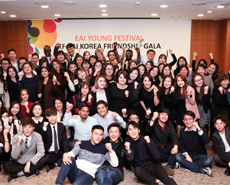
|
|
2015 EAI Young Festival & KF-EAI Korea Friendship Gala
As a part of KF-EAI Korea Friendship [Empathicus: Discovering Korea], the EAI Young Festival and Korea Friendship Gala were held at Kukdo hotel on October 29. While EAI Young Festival brought together all the participants of EAI’s educational programs, Korea Friendship Gala celebrated a commencement ceremony for the 2015 KF-EAI Friendship Program.

|
|
|
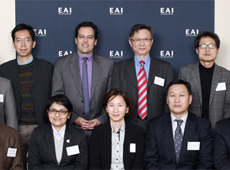
|
|
“Empowering the Asia Democracy Research Network”
On November 1, EAI held the ADRN second workshop in Seoul. During the workshop, ADRN representatives discussed specific action plans to strengthen the network, identity and mission of the ADRN, membership, and future research projects for the year 2016. 
|
|
|
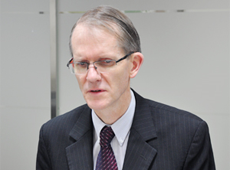
|
|
Australia’s Department of Foreign Affairs and Trade Visits EAI
Graham Fletcher, First Assistant Secretary of the Department of Foreign Affairs and Trade, Australia, visited EAI on October 27. Participants discussed issues such as South China Sea disputes, rise of China and middle power diplomacy, Korean unification, and Korea-Japan relations.

|
|
|
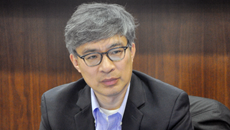
|
|
“Regulating the Internet in China in the Name of Civility”
On November 5, EAI invited Professor Yang Guobin of University of Pennsylvania to discuss the use of civility discourse as a new form of censorship enacted in part by non-state actors.

|
|
|
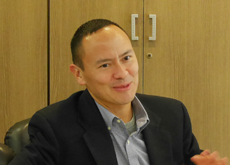
|
|
“Elite Cooperation and Opposition Fragmentation in Electoral Authoritarian Regimes”
On November 10, EAI invited Professor Leonardo Arriola of University of California, Berkeley to discuss how authoritarian regimes in Africa were able to maintain their long-term rule even after the implementation of the electoral system.

|
|
|
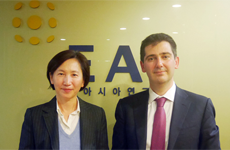
|
|
Strengthening the Global Network
Memduh Karakullukçu, President of Global Relations Forum, Turkey, visited EAI to discuss implications that South Korea’s democratization process and economic development have for fledgling democracies and middle power diplomacy.

|
|
|
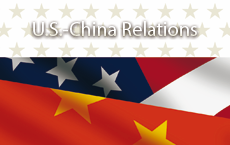
|
|
September UCR Briefing: Half Full or Half Empty?
In this issue, issues such as cyber security and military cooperation; Iran nuclear deal; passage of Japan Security Bill; reactions of the U.S. and China toward ISIL, Syrian Civil War, and the refugee issue; South China Sea disputes; and North Korean nuclear issues.

|
|
|
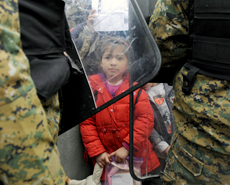
|
|
“Europe Divided over Response to Refugee Crisis”
Millions of Syrian refugees have flooded into Europe this year as they seek a safe and stable substitute home for their war-torn country. EAI President Sook-Jong Lee breaks down the divided European Union response to the refugee crisis and wonders how Asia would respond to a similar crisis.

|
|
|
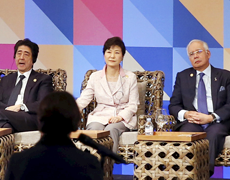
|
|
“Leveraging Middle Power Public Diplomacy in East Asian International Relations”
Jan Melissen and Yul Sohn look at different positions of each of five Asian middle powers and the role of public diplomacy in creating stability in the region. They then provide policy recommendations for Asian middle powers.

|
|
|
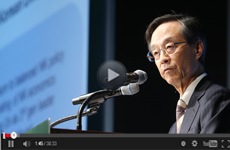
|
|
“Peaceful Unification Only with the Active Support of the U.S.”
Former Foreign Affairs Minister of Korea Sung-Joo Han stressed the fact that without the cooperation and support of the U.S., it will be difficult to get backing from neighboring countries such as China and Japan for peaceful unification of the Korean Peninsula.

|
|
|